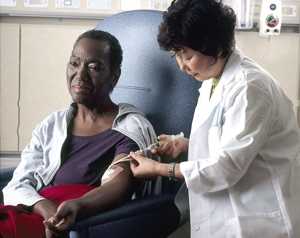Cancer Treatments

The treatment for cancer depends on the type of cancer and the stage of the disease (how severe the cancer is, and whether it has spread). Doctors may also consider the patient’s age and general health. Often, the goal of treatment is to cure the cancer. In other cases, the goal is to control the disease or to reduce symptoms for as long as possible. The treatment plan for a person may change over time.
Most treatment plans include surgery, radiation therapy, or chemotherapy. Other plans involve biological therapy or hormonal therapy.
- Surgery. An operation where doctors cut out tissue with cancer cells.
- Chemotherapy. Using special medicines to shrink or kill cancer cells. The drugs can be pills you take or medicines given in your veins, or sometimes both.
- Hormonal therapy. Blocks cancer cells from getting the hormones they need to grow.
- Biological therapy. Works with your body’s immune system to help it fight cancer cells or to control side effects from other cancer treatments. Side effects are how your body reacts to drugs or other treatments.
- Radiation therapy. Using high-energy rays (similar to X-rays) to kill cancer cells.
Some cancers respond best to a single type of treatment. Other cancers may respond best to a combination of treatments.
Doctors may recommend a stem cell transplant, also known as a bone marrow transplant, for patients who get very high doses of chemotherapy or radiation therapy. This is because high-dose therapies destroy both cancer cells and normal blood cells. A stem cell transplant can help the body to make healthy blood cells to replace the ones lost due to the cancer treatment. It’s a complicated procedure with many side effects and risks.
Talk to Your Doctor About the Right Treatment for You
Choosing the treatment that is right for you may be hard. Talk to your cancer doctor about the treatment options available for your type and stage of cancer. Your doctor can explain the risks and benefits of each treatment and their side effects.
Sometimes people get an opinion from more than one cancer doctor. This is called a “second opinion.” Getting a second opinion may help you choose the treatment that is right for you.
Clinical Trials
Cancer survivors might also talk to their doctor about clinical trials. Clinical trials are health-related studies that research medical strategies, treatments, or devices to see if they are safe and effective for people who have cancer or other illnesses. A clinical trial may test—
- A medical product, like a drug or device.
- A medical procedure.
- Instructions on how to change behavior, such as how to change your diet.
Complementary and Alternative Medicine
Complementary and alternative medicine are medicines and health practices that are not standard cancer treatments. Complementary medicine is used in addition to standard treatments, and alternative medicine is used instead of standard treatments. Meditation, yoga, and supplements like vitamins and herbs are some examples. Many kinds of complementary and alternative medicine have not been tested scientifically, so information is not available about their safety and effectiveness. Talk to your doctor about the risks and benefits before you start any kind of complementary or alternative medicine.
- Page last reviewed: May 30, 2017
- Page last updated: April 20, 2016
- Content source:
- Maintained By:


 ShareCompartir
ShareCompartir